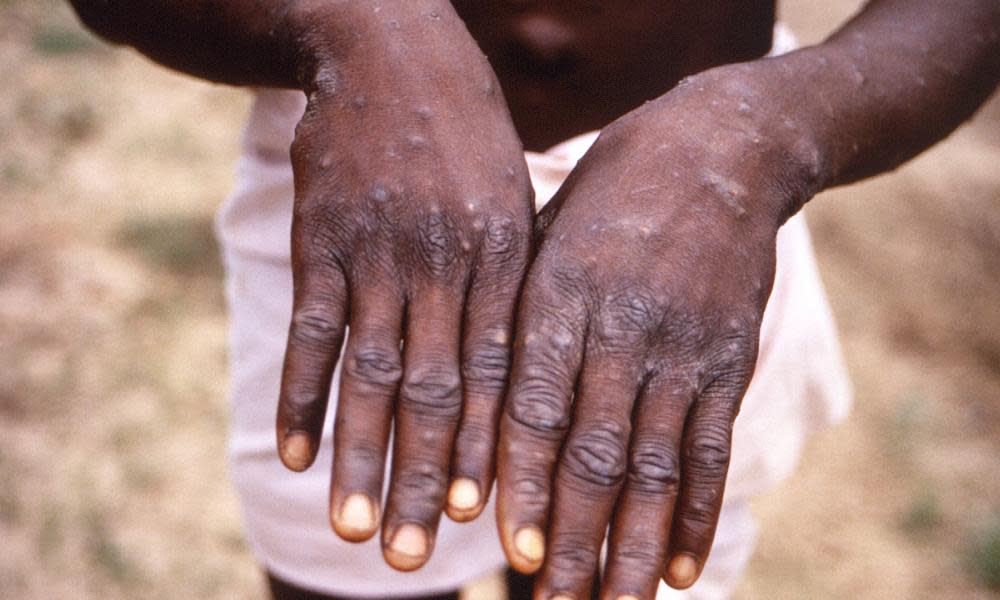Monkeypox outbreak was waiting to happen, say scientists

The unprecedented surge in monkeypox cases in the UK and beyond was an outbreak waiting to happen after the end of global smallpox vaccination more than 40 years ago, scientists say.
The UK Health Security Agency announced a further 14 cases in England on Tuesday, bringing the total to 70, and one further patient in Scotland. No cases have been identified in Wales or Northern Ireland.
Routine smallpox vaccination wound down in most countries before 1980 when the World Health Assembly declared the disease eradicated. Because the vaccine also protects against monkeypox, the campaign had kept that disease in check too, notably in regions of central and western Africa where the virus is endemic.
In the decades since smallpox vaccination ended, the proportion of people protected against monkeypox has fallen substantially, allowing the virus to spread more easily from animals into humans and from person to person, fuelling the risk of a major outbreak.
Related: Why are monkeypox cases suddenly emerging across the world and could the virus have mutated?
“This outbreak was really waiting to happen,” said Dr Romulus Breban, a researcher at the Pasteur Institute in Paris. Mathematical modelling by Breban and his team in 2020 found that in the Democratic Republic of the Congo, for example, immunity to monkeypox fell from 85% in the early 1980s to 60% in 2012. With declining immunity, monkeypox posed “an ever-increasing threat for health security”, he wrote at the time. In 2020 the DRC had more than 4,000 suspected cases and at least 171 deaths.
“Our immunity level is almost zero,” Breban said. “People aged 50 and above are likely to be immune but the rest of us not, so we are very, very susceptible.” He believes the outbreak can be contained and said it was an opportunity to propose vaccination campaigns in countries where the virus is endemic.
Until this year only a handful of cases of monkeypox had ever been spotted in the UK, all linked to travel from Nigeria. Since the first UK case of 2022 was announced on 7 May, nearly 300 suspected or confirmed cases have come to light in at least 16 countries.
The surge in cases has raised questions about whether the monkeypox virus has evolved into a more transmissible form. So far scientists have found no evidence for this being the case, but researchers are studying the DNA to see if mutations in the virus may have changed its behaviour. Genetic studies so far suggest the virus matches strains that reached the UK, Singapore and Israel in 2018 and 2019.
Prof David Heymann, a distinguished fellow at Chatham House’s global health programme, said the outbreak appeared more of a chance event, with the virus being amplified once it got into a community of men who have sex with men.
Graham Medley, a professor of infectious disease modelling at the London School of Hygiene & Tropical Medicine, said there was unlikely to be the same “explosive growth” of infections into the general population that was witnessed with Covid. But he said the outbreak could continue for several months as contact tracing slows but does not stop transmission.
“As with Covid, we can expect twists and turns as monkeypox outbreaks continue,” he said. “At the moment the transmission chains are mostly within sexually active younger men, but there are other settings where there is sufficient contact for monkeypox to spread. The longer the outbreak continues and the higher the prevalence, the more likely that monkeypox will find these other niches.”
Researchers in the UK have revealed promising yet tentative signs that an antiviral may help to reduce illness from the virus. In a study published in the Lancet Infectious Diseases, four of seven patients diagnosed with monkeypox in the UK between 2018 and 2021 were given either brincidofovir or tecovirimat, drugs developed to treat smallpox.
Findings from the three patients given brincidofovir suggest the drug provided little clinical benefit and did not appear to reduce the duration of the illness. However, the one patient treated with tecovirimat had a shorter hospital stay and appeared to shed virus, detected by PCR tests, for a shorter period of time.
Dr Hugh Adler, a co-author of the study at Liverpool university hospitals NHS trust, said that although only one patient was involved, the result for tecovirimat was “a promising signal”.
“Now that we’re seeing more cases, unexpectedly, we think it’s important to share,” he said. “This is the sum total of human experience with these drugs and monkeypox so far.”
The UK has secured a supply of tecovirimat and is offering a smallpox vaccine to close contacts of people diagnosed with monkeypox to reduce the risk of symptomatic infection and severe illness. Sources suggest an extra 20,000 doses of the vaccine have been ordered to add to the UK’s stock of 5,000.

 Yahoo Movies
Yahoo Movies 
